- Home
- Beverly Cleary
Ramona and Her Father Page 5
Ramona and Her Father Read online
Page 5
Ramona and her father went into the living room and turned on the television so they couldn’t overhear Beezus. When Ramona noticed her father reached for the cigarettes that were not there, she gave him a stern look.
In a moment Beezus appeared, looking flustered. “I meant sometime in a day or so, but she said to come right now because in a little while she has to take a molded salad to her lodge for a potluck supper. Dad, what’ll I say? I haven’t had time to think.”
“Just play it by ear,” he advised. “Something will come to you.”
“I’m going too,” Ramona said, and Beezus did not object.
Mrs. Swink saw the sisters coming and opened the door for them as they climbed the front steps. “Come on in, girls, and sit down,” she said briskly. “Now what is it you want to interview me about?”
Beezus seemed unable to say anything, and Ramona could understand how it might be hard to ask someone wearing a polyester pant suit questions about building a log cabin. Someone had to say something so Ramona spoke up. “My sister wants to know what you used to do when you were a little girl.”
Beezus found her tongue. “Like I said over the phone. It’s for creative writing.”
Mrs. Swink looked thoughtful. “Let’s see. Nothing very exciting, I’m afraid. I helped with the dishes and read a lot of books from the library. The Red Fairy Book and Blue Fairy Book and all the rest.”
Beezus looked worried, and Ramona could see that she was trying to figure out what she could write about dishes and library books. Ramona ended another awkward silence by asking, “Didn’t you make anything?” She had noticed that Mrs. Swink’s living room was decorated with mosaics made of dried peas and beans and with owls made out of pinecones. The dining-room table was strewn with old Christmas cards, scissors, and paste, a sure sign of a craft project.
“Let’s see now….” Mrs. Swink looked thoughtful. “We made fudge, and—oh, I know—tin-can stilts.” She smiled to herself. “I had forgotten all about tin-can stilts until this very minute.”
At last Beezus could ask a question. “How did you make tin-can stilts?”
Mrs. Swink laughed, remembering. “We took two tall cans. Two-pound coffee cans were best. We turned them upside down and punched two holes near what had once been the bottom of each. The holes had to be opposite one another on each can. Then we poked about four feet of heavy twine through each pair of holes and knotted the ends to make a loop. We set one foot on each can, took hold of a loop of twine in each hand, and began to walk. We had to remember to lift each can by the loop of twine as we raised a foot or we fell off—my knees were always skinned. Little girls wore dresses instead of slacks in those days, and I always had dreadful scabs on my knees.”
Maybe this was why Mrs. Swink always wore pant suits now, thought Ramona. She didn’t want scabs on her knees in case she fell down.
“And the noise those hollow tin cans made on the sidewalk!” continued Mrs. Swink, enjoying the memory. “All the kids in the neighborhood went clanking up and down. Sometimes the cans would cut through the twine, and we would go sprawling on the sidewalk. I became expert at walking on tin-can stilts and used to go clanking around the block yelling, ‘Pieface!’ at all the younger children.”
Ramona and Beezus both giggled. They were surprised that someone as old as Mrs. Swink had once called younger children by a name they sometimes called one another.
“There.” Mrs. Swink ended the interview. “Does that help?”
“Yes, thank you.” Beezus stood up, and so did Ramona, although she wanted to ask Mrs. Swink about the craft project on the dining-room table.
“Good.” Mrs. Swink opened the front door. “I hope you get an A on your composition.”
“Tin-can stilts weren’t exactly what I expected,” said Beezus, as the girls started home. “But I guess I can make them do.”
Do! Ramona couldn’t wait to get to Howie’s house to tell him about the tin-can stilts. And so, as Beezus went home to labor over her creative writing, Ramona ran over to the Kemps’ house. Just as she thought, Howie listened to her excited description and said, “I could make some of those.” Good old Howie. Ramona and Howie spent the rest of the afternoon finding four two-pound coffee cans. The search involved persuading Howie’s mother to empty out her coffee into mayonnaise jars and calling on neighbors to see if they had any empty cans.
The next day after school Howie arrived on the Quimby doorstep with two sets of tin-can stilts. “I made them!” he announced, proud of his work. “And Willa Jean wanted some, so I made her a pair out of tuna cans so she wouldn’t have far to fall.”
“I knew you could do it!” Ramona, who had already changed to her playclothes, stepped onto two of the cans and pulled the twine loops up tight before she took a cautious step, lifting a can as she lifted her foot. First the left foot, then the right foot. Clank, clank. They worked! Howie clanked along beside her. They clanked carefully down the driveway to the sidewalk, where Ramona tried to pick up speed, forgot to lift a can at the same time she lifted her foot, and, as Mrs. Swink had recalled, fell off her stilts. She caught herself before she tumbled to the sidewalk and climbed back on.
Clank, clank. Clank, clank. Ramona found deep satisfaction in making so much noise, and so did Howie. Mrs. Swink, turning into her driveway in her dignified old sedan, smiled and waved. In a moment of daring, Ramona yelled, “Pieface!” at her.
“Pieface yourself!” Mrs. Swink called back, understanding Ramona’s joke.
Howie did not approve. “You aren’t supposed to call grown-ups pieface,” he said. “Just kids.”
“I can call Mrs. Swink pieface,” boasted Ramona. “I can call her pieface any old time I want to.” Clank, clank. Clank, clank. Ramona was having such a good time she began to sing at the top of her voice, “Ninety-nine bottles of beer on the wall, ninety-nine bottles of beer. You take one down and pass it around. Ninety-eight bottles of beer on the wall…”
Howie joined the singing. “Ninety-eight bottles of beer on the wall. You take one down and pass it around. Ninety-seven bottles of beer…”
Clank, clank. Clank, clank. Ninety-six bottles of beer, ninety-five bottles of beer on the wall. Sometimes Ramona and Howie tripped, sometimes they stumbled, and once in a while they fell, muddying the knees of their corduroy pants on the wet sidewalk. Progress was slow, but what their stilts lost in speed they made up in noise.
Eighty-nine bottles of beer, eighty-six…Ramona was happier than than she had been in a long time. She loved making noise, and she was proud of being able to count backwards. Neighbors looked out their windows to see what all the racket was about while Ramona and Howie clanked determinedly on. “Eighty-one bottles of beer on the wall…” As Mrs. Swink had predicted, one of the twine loops broke, tumbling Ramona to the sidewalk. Howie knotted the ends together, and they clanked on until supper-time.
“That was some racket you two made,” remarked Mr. Quimby.
Mrs. Quimby asked, “Where on earth did you two pick up that song about bottles of beer?”
“From Beezus,” said Ramona virtuously. “Howie and I are going to count backwards all the way to one bottle of beer.”
Beezus, doing homework in her room, had not missed out on the conversation. “We used to sing it at camp when the counselors weren’t around,” she called out.
“When I used to go to camp, we sang about the teeny-weeny ’pider who went up the water ’pout,” said Mrs. Quimby.
The teeny-weeny ’pider song was a favorite of Ramona’s too, but it was not so satisfying as “Ninety-nine Bottles of Beer,” which was a much louder song.
“I wonder what the neighbors think,” said Mrs. Quimby. “Wouldn’t some other song do?”
“No,” said Ramona. Only a noisy song would do.
“By the way, Ramona,” said Mr. Quimby. “Did you straighten your room today?”
Ramona was not much interested in the question. “Sort of,” she answered truthfully, because she had shoved a lot of old sc
hool artwork and several pairs of dirty socks under the bed.
The next afternoon after school was even better, because Ramona and Howie had mastered walking on the tin-can stilts without falling off. “Sixty-one bottles of beer on the wall. Take one down and pass it around,” they sang, as they clanked around the block. Ramona grew hot and sweaty, and when rain began to fall, she enjoyed the cold drops against her flushed face. On and on they clanked, singing at the top of their voices. Ramona’s hair grew stringy, and Howie’s blond curls tightened in the rain. “Forty-one bottles of beer on the wall…” Clank, crash, clank. “Thirty-seven bottles of beer…” Clank, crash, clank. Ramona forgot about her father being out of a job, she forgot about how cross he had been since he gave up smoking, she forgot about her mother coming home tired from work and about Beezus being grouchy lately. She was filled with joy.
The early winter darkness had fallen and the streetlights had come on by the time Ramona and Howie had clanked and crashed and sung their way down to that last bottle of beer. Filled with a proud feeling that they had accomplished something big, they jumped off their stilts and ran home with their coffee cans banging and clashing behind them.
Ramona burst in through the back door, dropped her wet stilts with a crash on the linoleum, and announced hoarsely, “We did it! We sang all the way down to one bottle of beer!” She waited for her family to share her triumph.
Instead her father said, “Ramona, you know you are supposed to be home before dark. It was a good thing I could hear where you were, or I would have had to go out after you.”
Mrs. Quimby said, “Ramona, you’re sopping wet. Go change quickly before you catch cold.”
Beezus, who was often embarrassed by her little sister, said, “The neighbors will think we’re a bunch of beer guzzlers.”
Well! thought Ramona. Some family! She stood dripping on the linoleum a moment, expecting hurt feelings to take over, perhaps even to make her cry a little so her family would be sorry they had been mean to her. To her wonder, no heavy feeling weighed her down, no sad expression came to her face, no tears. She simply stood there, cold, dripping, and feeling good. She felt good from making a lot of noise, she felt good from the hard work of walking so far on her tin-can stilts, she felt good from calling a grown-up pieface and from the triumph of singing backwards from ninety-nine to one. She felt good from being out after dark with rain on her face and the streetlights shining down on her. Her feelings were not hurt at all.
“Don’t just stand there sogging,” said Beezus. “You’re supposed to set the table.”
Bossy old Beezus, thought Ramona. She squelched off to her room in her wet sneakers, and as she left the kitchen she began to sing, “Ninety-nine bottles of beer on the wall…”
“Oh, no!” groaned her father.
6
The Sheep Suit
Ramona did not expect trouble to start in Sunday school of all places, but that was where it was touched off one Sunday early in December. Sunday school began as usual. Ramona sat on a little chair between Davy and Howie with the rest of their class in the basement of the gray stone church. Mrs. Russo, the superintendent, clapped her hands for attention.
“Let’s have quiet, boys and girls,” she said. “It’s time to make plans for our Christmas-carol program and Nativity scene.”
Bored, Ramona hooked her heels on the rung of her little chair. She knew what her part would be—to put on a white choir robe and walk in singing carols with the rest of the second-grade class, which would follow the kindergarten and first grade. The congregation always murmured and smiled at the kindergarteners in their wobbly line, but nobody paid much attention to second graders. Ramona knew she would have to wait years to be old enough for a chance at a part in the Nativity scene.
Ramona only half listened until Mrs. Russo asked Beezus’s friend Henry Huggins if he would like to be Joseph. Ramona expected him to say no, because he was so busy training for the Olympics in about eight or twelve years. He surprised her by saying, “I guess so.”
“And Beatrice Quimby,” said Mrs. Russo, “would you like to be Mary?”
This question made Ramona unhook her heels and sit up. Her sister, grouchy old Beezus—Mary? Ramona searched out Beezus, who was looking pink, embarrassed, and pleased at the same time.
“Yes,” answered Beezus.
Ramona couldn’t get over it. Her sister playing the part of Mary, mother of the baby Jesus, and getting to sit up there on the chancel with that manger they got out every year.
Mrs. Russo had to call on a number of older boys before she found three who were willing to be wise men. Shepherds were easier. Three sixth-grade boys were willing to be shepherds.
While the planning was going on, a little voice inside Ramona was saying, “Me! Me! What about me?” until it could be hushed no longer. Ramona spoke up. “Mrs. Russo, I could be a sheep. If you have shepherds, you need a sheep.”
“Ramona, that’s a splendid idea,” said Mrs. Russo, getting Ramona’s hopes up, “but I’m afraid the church does not have any sheep costumes.”
Ramona was not a girl to abandon her hopes if she could help it. “My mother could make me a sheep costume,” she said. “She’s made me lots of costumes.” Maybe “lots” was stretching the truth a bit. Mrs. Quimby had made Ramona a witch costume that had lasted three Halloweens, and when Ramona was in nursery school she had made her a little red devil suit.
Now Mrs. Russo was in a difficult position because she had told Ramona her idea was splendid.
“Well…yes, Ramona, you may be a sheep if your mother will make you a costume.”
Howie had been thinking things over. “Mrs. Russo,” he said in that serious way of his, “wouldn’t it look silly for three shepherds to herd just one sheep? My grandmother could make me a sheep costume, too.”
“And my mother could make me one,” said Davy.
Sunday school was suddenly full of volunteer sheep, enough for a large flock. Mrs. Russo clapped her hands for silence. “Quiet, boys and girls! There isn’t room on the chancel for so many sheep, but I think we can squeeze in one sheep per shepherd. Ramona, Howie, and Davy, since you asked first, you may be sheep if someone will make you costumes.”
Ramona smiled across the room at Beezus. They would be in the Nativity scene together.
When Sunday school was over, Beezus found Ramona and asked, “Where’s Mother going to find time to make a sheep costume?”
“After work, I guess.” This problem was something Ramona had not considered.
Beezus looked doubtful. “I’m glad the church already has my costume,” she said. Ramona began to worry.
Mrs. Quimby always washed her hair after church on Sunday morning. Ramona waited until her mother had taken her head out from under the kitchen faucet and was rubbing her hair on a bath towel. “Guess what!” said Ramona. “I get to be a sheep in the Nativity scene this year.”
“That’s nice,” said Mrs. Quimby. “I’m glad they are going to do something a little different this year.”
“And I get to be Mary,” said Beezus.
“Good!” said Mrs. Quimby, still rubbing.
“I’ll need a sheep costume,” said Ramona.
“The church has my costume,” said Beezus.
Ramona gave her sister a you-shut-up look. Beezus smiled serenely. Ramona hoped she wasn’t going to start acting like Mary already.
Mrs. Quimby stopped rubbing to look at Ramona. “And where are you going to get this sheep costume?” she asked.
Ramona felt very small. “I—I thought you could make me a sheep suit.”
“When?”
Ramona felt even smaller. “After work?”
Mrs. Quimby sighed. “Ramona, I don’t like to disappoint you, but I’m tired when I come home from work. I don’t have time to do a lot of sewing. A sheep suit would be a lot of work and mean a lot of little pieces to put together, and I don’t even know if I could find a sheep pattern.”
Mr. Quimby joined in the co
nversation. That was the trouble with a father with time on his hands. He always had time for other people’s arguments. “Ramona,” he said, “you know better than to involve other people in work without asking first.”
Ramona wished her father could sew. He had plenty of time. “Maybe Howie’s grandmother could make me a costume, too,” she suggested.
“We can’t ask favors like that,” said Mrs. Quimby, “and besides material costs money, and with Christmas coming and all we don’t have a nickel to spare.”
Ramona knew all this. She simply hadn’t thought; she had wanted to be a sheep so much. She gulped and sniffed and tried to wiggle her toes inside her shoes. Her feet were growing and her shoes felt tight. She was glad she had not mentioned this to her mother. She would never get a costume if they had to buy shoes.
Mrs. Quimby draped the towel around her shoulders and reached for her comb.
“I can’t be a sheep without a costume.” Ramona sniffed again. She would gladly suffer tight shoes if she could have a costume instead.
“It’s your own fault,” said Mr. Quimby. “You should have thought.”
Ramona now wished she had waited until after Christmas to persuade her father to give up smoking. Then maybe he would be nice to his little girl when she needed a sheep costume.
Mrs. Quimby pulled the comb through her tangled hair. “I’ll see what I can do,” she said. “We have that old white terry-cloth bathrobe with the sleeve seams that pulled out. It’s pretty shabby, but if I bleached it, I might be able to do something with it.”
Ramona stopped sniffing. Her mother would try to make everything all right, but Ramona was not going to risk telling about her tight shoes in case she couldn’t make a costume out of the bathrobe and needed to buy material.
That evening, after Ramona had gone to bed, she heard her mother and father in their bedroom talking in those low, serious voices that so often meant that they were talking about her. She slipped out of bed and knelt on the floor with her ear against the furnace outlet to see if she could catch their words.

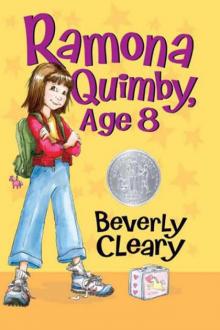 Ramona Quimby, Age 8
Ramona Quimby, Age 8 Dear Mr. Henshaw
Dear Mr. Henshaw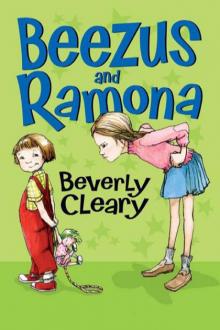 Beezus and Ramona
Beezus and Ramona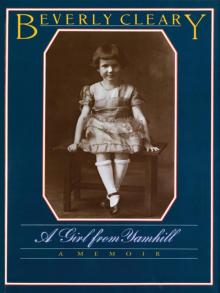 A Girl from Yamhill
A Girl from Yamhill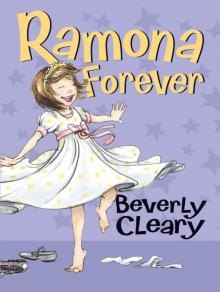 Ramona Forever
Ramona Forever Jean and Johnny
Jean and Johnny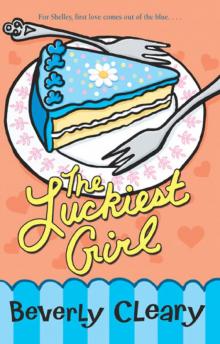 The Luckiest Girl
The Luckiest Girl Emily's Runaway Imagination
Emily's Runaway Imagination Ribsy
Ribsy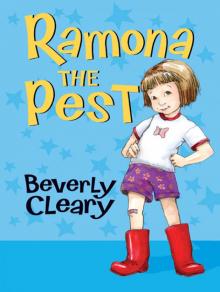 Ramona the Pest
Ramona the Pest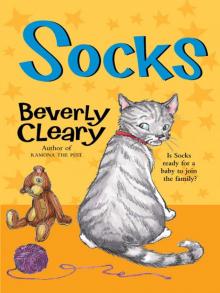 Socks
Socks Ramona's World
Ramona's World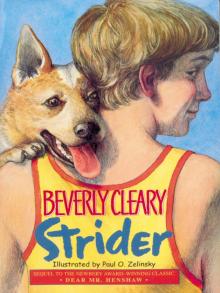 Strider
Strider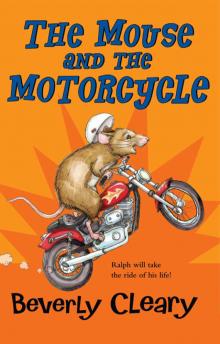 The Mouse and the Motorcycle
The Mouse and the Motorcycle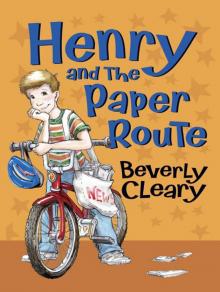 Henry and the Paper Route
Henry and the Paper Route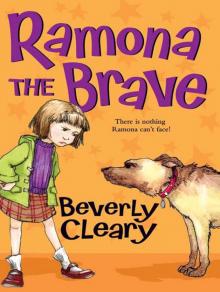 Ramona the Brave
Ramona the Brave Henry Huggins
Henry Huggins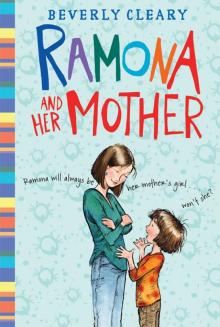 Ramona and Her Mother
Ramona and Her Mother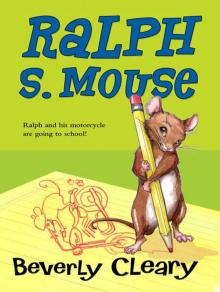 Ralph S. Mouse
Ralph S. Mouse Sister of the Bride
Sister of the Bride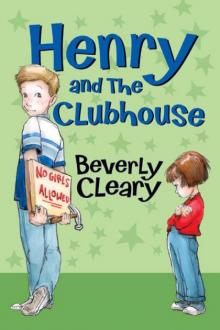 Henry and the Clubhouse
Henry and the Clubhouse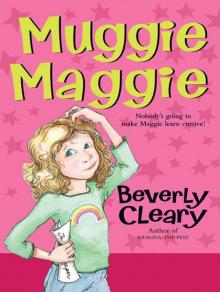 Muggie Maggie
Muggie Maggie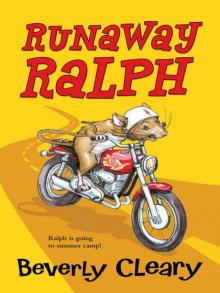 Runaway Ralph
Runaway Ralph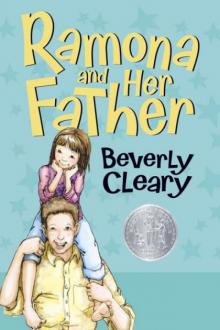 Ramona and Her Father
Ramona and Her Father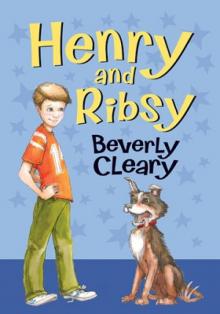 Henry and Ribsy
Henry and Ribsy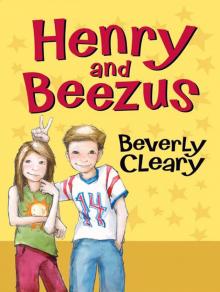 Henry and Beezus
Henry and Beezus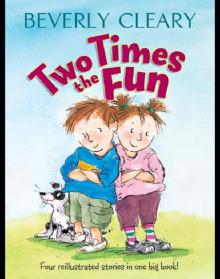 Two Times the Fun
Two Times the Fun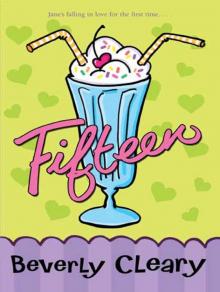 Fifteen
Fifteen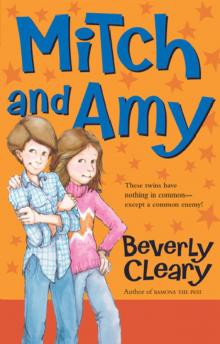 Mitch and Amy
Mitch and Amy